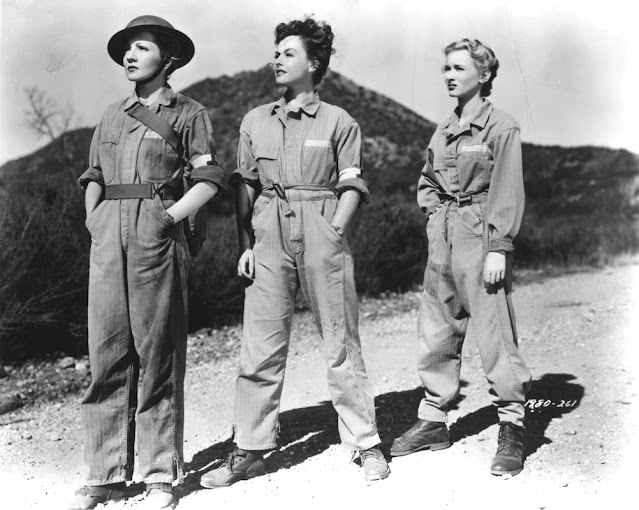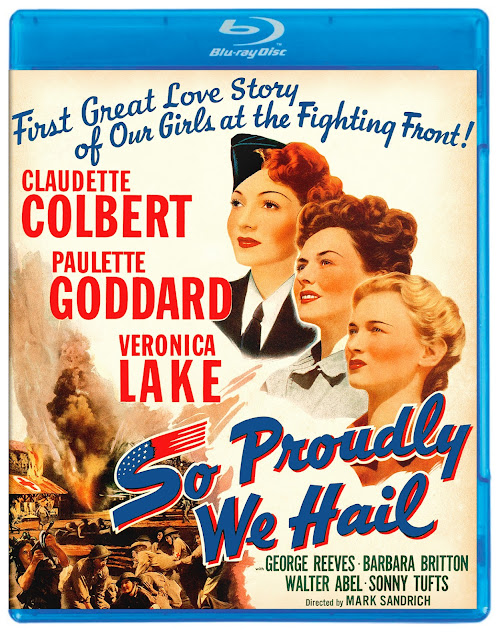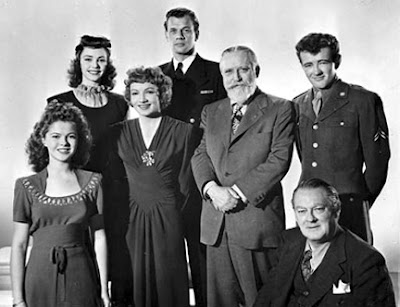Directed and produced by Mark Sandrich, So Proudly We Hail (1943) is a fictional depiction of the Angels of Bataan, a group of nurses during WWII who tended to wounded soldiers in Bataan and Corregidor. The film stars Claudette Colbert, Paulette Goddard and Veronica Lake as three nurses who are serve in Bataan. The story is told in a flashback sequence from the point in which some of the nurses have been rescued and brought to Australia. This tempers the story giving us a bit of hope at the beginning despite what we'll see throughout the movie.
Colbert plays Lt. Janet Davidson, affectionately known as Davey, a loyal and reliable nurse who cares deeply about her work and her fellow nurses. In present day she's in a catatonic state, unable to speak, and the story follows the series of events that led her to that point. Lt. Joan O'Doul (Paulette Goddard) is the life of the party mostly concerned with the social aspects of her job. Lt.d Olivia D'Arcy (Veronica Lake) is the total opposite; she's grown bitter having gone through the trauma of seeing her husband die during the bombing of Pearl Harbor. Out of all the characters, she's got the most interesting character development.
The film follows the particulars of their work and their relationships with each other and the men in their lives. While we don't ever meet Olivia's husband, we do see Joan fall for Kansas (Sonny Tufts), an aw-shucks football-player-turned-Marine, and Davey fall for Lt. John Summers (George Reeves), a headstrong medic with a tender heart.
So Proudly We Hail! is one of several movies about the Battle of Bataan and one of two released that same year about these nurses in particular. MGM released Cry 'Havoc' (1943) a couple of months after Paramount Pictures released So Proudly We Hail!. Cry 'Havoc' is a fine picture in its own right and boasts a stellar cast including Margaret Sullavan, Ann Sothern, Joan Blondell, Marsha Hunt and Ella Raines. While they both told similar stories, So Proudly We Hail! leans more on the dramatic elements, giving viewers more of a sense of the danger the troops and the nurses faced during the Battle of Bataan. The script was based on Lt. Colonel Juanita Hipps' best-selling memoir and adapted for the screen by writer Allan Scott. There are several storylines happening at once which makes the plot a little difficult to follow. However, that also speaks to the chaotic nature of the environment. When the film released in September 1943, many of the nurses were still imprisoned by the Japanese as POWs so this film must have been quite poignant for contemporary viewers.
According to TCM writer Jeremy Arnold, So Proudly We Hail! was a perfect combination of "the combat film and the woman's picture." You have the intense battle scenes with both visual and sound effects (the movie was nominated for an Academy Award in this category) juxtaposed with "a wedding, a honeymoon (in a foxhole, no less), a dance, childbirth, mother-son scenes, and even a negligee which figures prominently in the plot." The negligee plot line was tiresome and it seemed like it was thrown in there to give Goddard more to do. Otherwise, I felt the combination of elements really made this for an enjoyable mix of serious drama and more lighthearted moments.
TCM writer Rob Nixon notes that Chief Nelson Poynter of the Office of War Information "meddled in almost every aspect of the script." Some of these worked in the film's favor by softening the good vs. evil elements and focusing more on team effort and hope. The film begins with a thank you to various units and advisors and is followed by a written introduction providing the viewer context before the story begins. Poynter was also responsible for a monologue delivered by Walter Abel who plays a Marine chaplain. It is a very sentimental monologue but I quite enjoyed it. There is something quite comforting about the emotional aspects of these films released during WWII. There is a profound sense camaraderie and a willingness to work and make sacrifices for the greater good.
"We're a sentimental people, and I think we're proud of it. Despite the fact that our enemies deride us for it, it makes us the stronger... Have faith... Not a blind faith, but faith in those things in which we believe. We must have such faith in those things, such faith in ourselves, such faith in mankind that we are tough about the things we believe in, so tough that we will fight to the death to make those tender and sentimental beliefs like Christmas... a reality forever. Now, God bless us. Every one." - Chaplain (Walter Abel)
As far as the performances are concerned, Claudette Colbert and Paulette Goddard essentially play a variation of a character type they've been known to play. Goddard's role was expanded to give her more screen time. Sonny Tufts, in his film debut, serves as her romantic interest. While she was the one nominated for the Academy Award for Best Supporting Actress, I think, if anything, that nomination should have gone to Veronica Lake. She has a short but powerful role and her intensity really stands out amongst the other performances. Her character is by far the most interesting because she's an outlier and an example of how war changes people. Lake wrote about the film in her memoir. She spoke about how Colbert and Goddard did not get along on set. She was proud of the film, writing to her then husband John Detlie:
“So Proudly We Hail is more than just another Hollywood film, John. It’s a salute to the military. I’m proud to be in the film.”
The film includes several mentions of Superman which is fitting given that George Reeves would go on to play the role years later. It's said that Reeves was inspired by his performance in the film to join the Army Air Corps.
So Proudly We Hail! (1943) is available on Blu-Ray from Kino Lorber Studio Classics. It's been restored from a brand new 2K master and looks as good as a black and white film can look. Extras include audio commentary by film historian Julie Kirgo, various Kino Lorber theatrical trailers and English language subtitles.
Thank you to Kino Lorber for sending me a copy of So Proudly We Hail (1943) for review!















